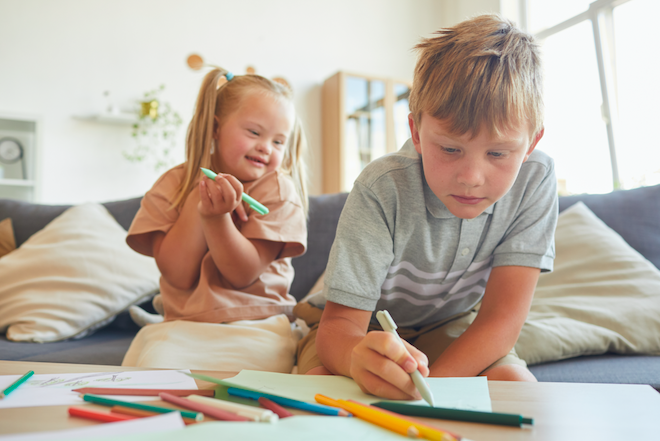On a recent Facebook Live session in our “Circle of Care” Facebook group, we had the pleasure of hearing from guest host Jessica Leving Siegel, author of “Billy’s Sister: Life when your sibling has a disability,” host of “The Special Siblings Podcast,” and founder of The Center for Siblings of People with Disabilities.
Jessica grew up with a brother with autism. She learned firsthand that the experiences and struggles of “special siblings” are often not addressed, especially in the professional realm. She opened up about the challenges she faced that many of these siblings face every day and shared tips for parents, caregivers, friends, and the general public to better support them.
What are some of the common challenges these siblings face?
According to Jessica, the therapists and staff at her brother’s clinic had many parents come in desperately looking for resources for their neurotypical children who were struggling with issues related to behavior, mental and emotional health, depression, and anxiety.
She admits that growing up, she experienced feelings of embarrassment from not knowing how to explain her brother’s disability, loneliness from him not being able to play with her, and jealousy when he received more attention from their parents. After talking more with the clinicians, she realized that many other siblings felt the exact same way.
New data indicates that siblings of people with disabilities have higher rates of anxiety, depression, and eating disorders than the general public. While this research is still very new and there is not currently any concrete data suggesting exact causes or treatment, Jessica has done her own research and interviewed other special needs siblings over the course of her life to learn some possible causes.
Here’s what she found.
Siblings Suppress Their Emotions
Many of the individuals Jessica has interviewed admit that they made it a habit to suppress their uncomfortable emotions early on in their childhood. They quietly struggle(d) with guilt for feeling angry, sad, embarrassed, or jealous towards their disabled brother or sister.
“This doesn’t come from a bad place where you feel like your disabled sibling is ruining your life,” Jessica says. “It comes from a place of loving your sibling so much and being so grateful for your health, that when you experience negative emotions when a situation seems unfair or there’s something that you don’t like, you tell yourself ‘I shouldn’t feel that way, I should be accommodating, I should help mom and dad, I don’t want to add to their stress’ etc.”
When these behaviors are rewarded with positive affirmations from others, usually parents, the siblings learn that this is the “right” behavior and therefore they make it a habit. Eventually, some siblings forget how to express or even identify anger. Internalizing these feelings over and over again can lead to these very necessary emotions expressing themselves in harmful ways, such as depression, anxiety, and eating disorders.
Siblings Can Experience a Loss of Their Own Identity
Most of the time, the neurotypical siblings don’t have outbursts or tantrums (though these certainly do happen occasionally). More often, we see siblings take on a “mommy’s helper” role where they feel obligated to help babysit, keep the house in order, get good grades in school, and be the perfect child in order to help alleviate their parents’ stress.
When Jessica was young, she volunteered in her brother’s special ed classroom. She says that she received so much positive reinforcement from her parents, educators, and other students’ parents, that she started to build her identity around those achievements. Because of this, she spent years of her life assuming she was meant to be a special ed teacher one day, even though she didn’t really believe it would make her happy.
For tips on how to validate and support special needs siblings, you can watch Jessica’s Facebook Live session in our “Circle of Care” Facebook group here.

